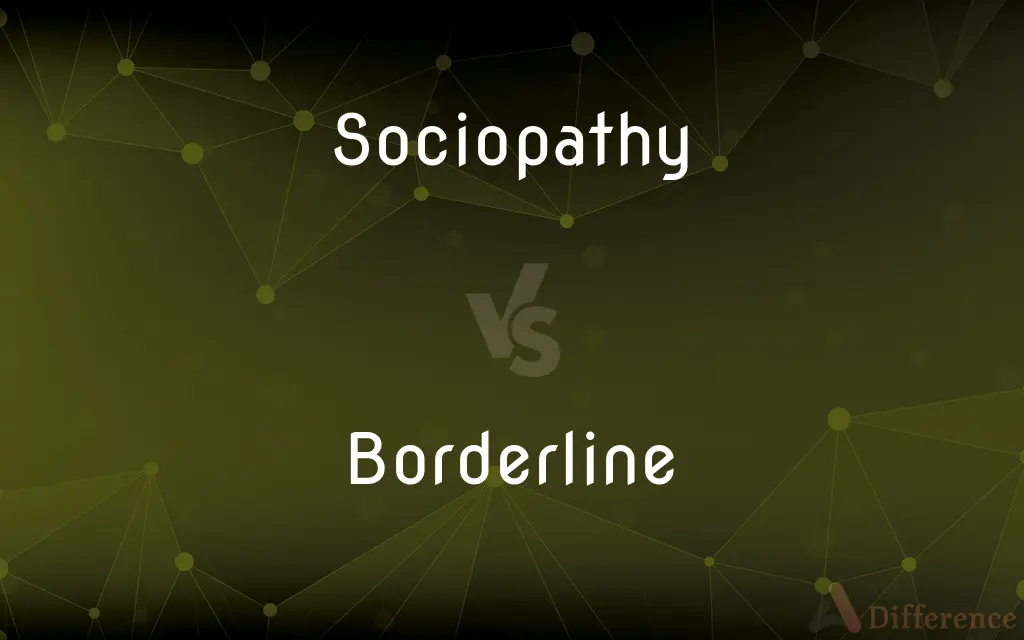Sociopathy vs. Borderline — What's the Difference?
By Urooj Arif & Fiza Rafique — Updated on April 22, 2024
Sociopathy is the lack of empathy and a tendency to manipulate the rights of others, often seen in Antisocial Personality Disorder. Borderline Personality Disorder involves intense emotional instability, fears of abandonment, and unstable relationships.

Difference Between Sociopathy and Borderline
Table of Contents
ADVERTISEMENT
Key Differences
Sociopathy, often linked to Antisocial Personality Disorder, manifests in a disregard for social norms and the rights of others, including deceitfulness and impulsivity. Individuals with sociopathy may struggle with empathy and tend to manipulate or treat others harshly without remorse. Borderline Personality Disorder is marked by emotional turbulence, fear of abandonment, and intense, unstable relationships. People with BPD experience wide mood swings, a distorted self-image, and may engage in self-destructive behaviors or have intense episodes of anger, depression, and anxiety.
Sociopathy focuses on antisocial behaviors and a lack of empathy towards others, while BPD centers around emotional instability and impaired self-image. The interpersonal relationships in sociopathy are often manipulative, whereas in BPD, they are intense and fear-driven.
Individuals with sociopathy might not seek relationships or emotional connections, viewing interactions as opportunities for manipulation. In contrast, those with BPD desperately seek connections but are plagued by fears of rejection and abandonment, leading to turbulent relationships.
Despite their differences, both disorders can lead to significant distress and impairment in social, occupational, or other important areas of functioning. However, the underlying issues, treatment approaches, and outcomes can vary significantly between sociopathy and BPD.
Comparison Chart
Empathy
Markedly reduced or absent
Present but unstable
ADVERTISEMENT
Relationship Style
Manipulative, exploitative
Intense, unstable
Emotional Stability
Limited emotional response
Highly unstable, intense mood swings
Self-Image
Often inflated, with narcissistic traits
Distorted, fluctuating
Fear of Abandonment
Generally not a concern
Central concern, leading to frantic efforts to avoid real or imagined abandonment
Compare with Definitions
Sociopathy
A pattern of disregarding or violating the rights of others.
A sociopath may lie or deceive others for personal gain.
Borderline
Experiences intense emotional instability and mood swings.
A person with BPD may feel ecstatic one moment and despairing the next.
Sociopathy
Struggles with empathy towards others.
A sociopath might not understand or care about the emotional distress of others.
Borderline
Has a profound fear of abandonment.
Individuals with BPD may go to great lengths to avoid being left alone.
Sociopathy
Characterized by a lack of remorse or guilt.
After manipulating someone, a sociopath feels no guilt.
Borderline
Engages in unstable relationships.
Relationships can swing from idealization to devaluation quickly.
Sociopathy
Exhibits impulsivity and aggression.
Sociopaths may engage in fights or physical confrontations.
Borderline
Exhibits impulsive and often self-destructive behaviors.
Impulsivity in BPD can lead to risky behaviors like substance abuse.
Sociopathy
Inclined towards deceit and manipulation.
Sociopaths often manipulate others for personal benefit or pleasure.
Borderline
Suffers from a distorted and unstable self-image.
A person with BPD might switch between hating and loving themselves.
Sociopathy
A psychopath or a person with antisocial personality disorder.
Borderline
Of a questionable nature or quality
An applicant with borderline qualifications.
Sociopathy
(psychiatry) The property of being a sociopath—a person showing antisocial behavior as part of psychiatric pathology.
Borderline
(Psychiatry) Of, related to, or having borderline personality disorder.
Borderline
Exhibiting borderline personality disorder.
Common Curiosities
Are there effective treatments for sociopathy and BPD?
BPD has more established treatments, including dialectical behavior therapy (DBT) and psychotherapy. Treatments for sociopathy are challenging and less effective but can include therapy and behavioral interventions.
Do people with sociopathy or BPD realize they have a disorder?
Awareness varies; people with BPD are more likely to seek help due to their suffering, whereas those with sociopathy may not see their behavior as problematic.
Can someone have both sociopathy and BPD?
It's rare but possible for an individual to exhibit traits of both disorders, complicating diagnosis and treatment.
Is sociopathy considered a form of psychopathy?
Yes, sociopathy is often considered a form of psychopathy, with both falling under the broader category of Antisocial Personality Disorder.
How is BPD diagnosed?
BPD is diagnosed based on a pattern of unstable relationships, self-image, and emotions, along with impulsive behaviors, as outlined in diagnostic criteria like the DSM-5.
How do these disorders affect relationships?
Sociopathy often leads to exploitative relationships, while BPD causes intense, fear-driven relationships.
How common are these disorders?
BPD affects about 1.6% of the adult population, while ASPD affects about 1-4%.
Can sociopathy or BPD be cured?
There's no cure, but symptoms can be managed through therapy and support.
Can children be diagnosed with these disorders?
Diagnosis usually occurs in adulthood, but signs can appear in childhood. Conduct Disorder is often diagnosed in children who later develop ASPD.
What causes these disorders?
Both genetic and environmental factors contribute, including childhood trauma, brain structure and function, and family history.
Is medication effective for these disorders?
Medication can help manage specific symptoms (e.g., mood swings in BPD) but is not a standalone treatment.
Is it safe to be in a relationship with someone with these disorders?
Safety depends on many factors, including the severity of symptoms and engagement in treatment.
Are sociopathy and BPD genetic?
Both have a genetic component, but environment also plays a crucial role.
How can I support someone with BPD or sociopathy?
Support involves encouraging treatment, setting boundaries, and seeking support for oneself.
Are there resources for people dealing with these disorders?
Yes, there are many resources, including therapy, support groups, and educational materials.
Share Your Discovery

Previous Comparison
Driving Lights vs. Fog Lights
Next Comparison
Cinnamon Bun vs. Cinnamon RollAuthor Spotlight
Written by
Urooj ArifUrooj is a skilled content writer at Ask Difference, known for her exceptional ability to simplify complex topics into engaging and informative content. With a passion for research and a flair for clear, concise writing, she consistently delivers articles that resonate with our diverse audience.
Co-written by
Fiza RafiqueFiza Rafique is a skilled content writer at AskDifference.com, where she meticulously refines and enhances written pieces. Drawing from her vast editorial expertise, Fiza ensures clarity, accuracy, and precision in every article. Passionate about language, she continually seeks to elevate the quality of content for readers worldwide.
















































